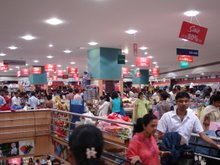What is a great brand?
GREAT brands sell and sell repeatedly, generating an ever increasing and sustainable revenue and profit stream. And they do this by continually creating value for consumers and customers through being relevant and differentiated. Great brands are great businesses that have pricing power and staying power. They don’t rent volume for short-term gains. Great brands make people feel good about the decisions they make. They stand for something that is important to consumers and every action reinforces what the brand stands for. Great brands become icons or symbols against which every other brand is interpreted. Great brands energise people and galvanise action. And in a consumer democracy, where people vote with their money everyday, they separate winners from losers; they know how to get elected. This is a tough time to get elected, particularly for incumbents — whether they be political leaders or incumbent brands. The insurgent always seems to have the more relevant message and tries harder. The insurgent converges just enough to be in the dialogue, but not enough to be undifferentiated. Voters and consumers reserve the right to change their decisions with new information and new experiences. There is no preference in perpetuity and therefore brands have to earn the trust of their consumers every day, in some cases several times a day. Great brands are made by people who understand the intrinsic value of the brand as a business. Like successful politicians, they own the issue and dimensionalise the idea. Nike has figured that its brand essence is about athleticism and fitness. So, the sport becomes less relevant than the idea of athletics — it is about playing, about ‘just doing it’. What started as a brand for serious athletes has transformed into a brand for all of us, while retaining the emotional connect with sports and fitness. Great brands invent or re-invent an entire category. Starbucks was launched in the USA when coffee consumption was declining. But, coffee consumption at home was declining. The proposition and business model of Starbucks not only made coffee cool, it also ensured that consumers paid a lot more for a cup of coffee than they had ever done before, and certainly a lot more than a can of Coke or Pepsi. Apple continues to differentiate itself via a product-based experience, which it delivers through a variety of products. We live in a time when the forces of choice and change dominate every market and change comes faster and more dramatically than ever before. India will see an explosion in availability and demand, across most categories, from airlines to cars to cosmetics, food etc. Organising for stability is not a good plan in this environment. Organising for change is, and brands that think and act like insurgents in this environment, giving people reasons to vote for them, will win. Brand equity and brand value is not about intention or attitude; it is about preference and usage. Great brands understand that.
Courtesy: EconomicTimes
For more detail on Retail India visit: http://www.retailindia.tv


No comments:
Post a Comment